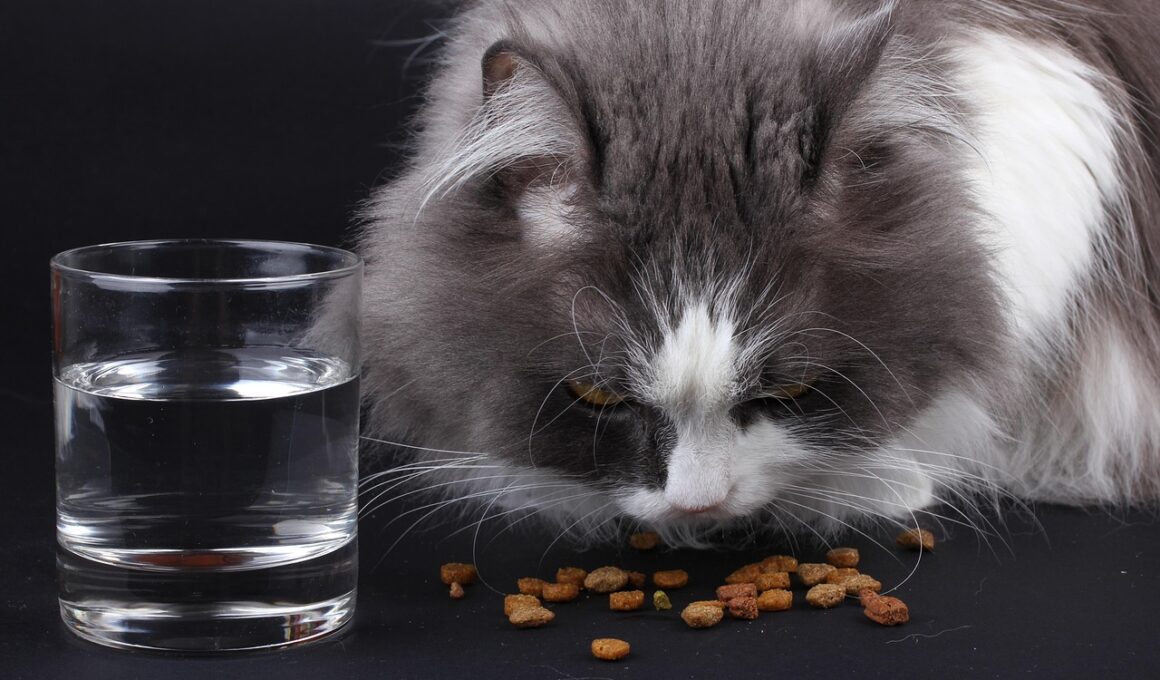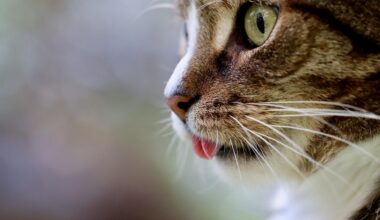Feeding Strategies to Support Healthy Aging in Cats
When it comes to cat nutrition, the focus should shift as they age. Senior cats often require different dietary needs than younger felines. Providing a balanced diet can significantly affect their overall health and longevity. Owners should prioritize high-quality protein sources, as they help maintain muscle mass. Moreover, including omega-3 fatty acids can support cognitive function and joint health in older cats. Another vital component is moisture; canned food can keep seniors hydrated. Dry food typically lacks this hydrating aspect, potentially leading to kidney issues. Choosing age-appropriate formulas ensures that cats receive the necessary vitamins and minerals for optimal health. It’s advisable to consult your veterinarian for personalized recommendations based on their health status. Regular monitoring of their weight and condition is essential as well. Moreover, consider the palatability of food, as senior cats can be picky. They may lose interest, so rotating flavors can be beneficial. By focusing on these aspects, cat owners can help support their furry friends through their golden years.
Understanding Nutritional Needs
Understanding the nutritional needs of older cats is crucial for ensuring their longevity. Aging often brings about various health challenges that can be mitigated with proper nutrition. One primary change is the need for fewer calories due to decreased activity levels. However, it’s essential that cats still obtain adequate protein to preserve muscle mass, which diminishes with age. Additionally, antioxidants such as vitamins C and E should be incorporated into their diets for immune system support. These antioxidants combat oxidative stress that may harm aging cells. Furthermore, fiber plays a significant role in digestive health, aiding in regular bowel movements. Within these considerations, it’s also essential to account for specific health conditions, such as diabetes or kidney disease. Specialized diets exist to meet these unique needs, and consulting with a vet is vital when making dietary changes. Incorporating taurine is another area of focus, as it supports heart health. Keep in mind that hydration is paramount, and adjusting the balance of wet and dry food may be necessary for seniors.
A crucial aspect of feeding strategies involves meal frequency. Older cats often benefit from more frequent, smaller meals throughout the day, rather than one to two larger servings. This approach aids digestion and ensures more consistent energy levels. Selecting high-quality proteins is paramount, as these are vital for maintaining muscle mass, crucial in older cats. Foods enriched with taurine can aid in heart health and vision. Additionally, the incorporation of glucosamine and chondroitin can support joint health, keeping older cats active. Cats experiencing dental issues may require softer food options, so adjusting the texture is necessary to ensure they receive adequate nutrition. Furthermore, regular check-ups with the vet help in adjusting their diet based on specific health needs. Cats are unique individuals, and what works for one may not for another. Adapting meals to consider food sensitivities or allergies is important, as these can develop over time. Observing your cat’s reactions to different foods can also guide you in making the best choices to support their dietary needs and longevity.
Benefits of Regular Feeding Schedule
A regular feeding schedule provides several benefits for aging cats. Firstly, it helps in establishing a routine, which can be very beneficial for their mental health. Cats thrive on predictability, and knowing when to expect meals can reduce anxiety. Moreover, it can prevent overeating, as cats tend to eat whatever is available. A measured feeding approach ensures they don’t gain excessive weight, which can lead to other health complications. This controlled feeding also allows owners to observe their cats for any changes in appetite or condition. Stabilized blood sugar levels are another significant benefit of regular feeding schedules. Typically, two to three small meals a day is effective for older cats. By spreading their caloric intake, energy is sustained throughout the day, counteracting fatigue or lethargy. Additionally, when transitioning to new food, a schedule can ease the process, allowing gradual adaptation. Owners need to monitor their cat’s weight consistently and adjust meal sizes based on changes in activity and health status. It is crucial to ensure that they remain at a healthy weight to enjoy their later years.
Supplementing a senior cat’s diet can also be crucial in promoting longevity. Introducing supplements should always be discussed with a veterinarian to cater to your cat’s specific needs. Some pets can greatly benefit from probiotics, which aid digestive health and help maintain a robust gut flora balance. It can enhance nutrient absorption and support immune functions as well. Moreover, fatty acids such as Omega-3 are essential in minimizing inflammation, promoting healthy skin and coat. Adding probiotics can also enhance the overall quality of life, helping older cats feel more vibrant. Dietary supplements, however, must be carefully selected to avoid overwhelming their system with unnecessary components. Ensuring that each addition is based on evidence-backed benefits is vital. Furthermore, forms such as powder or liquid may sometimes be preferable, depending on individual preferences. Always monitor for any adverse reactions when introducing new supplements. Regular communication with your vet plays a critical role in this process. Tailoring dietary adjustments according to your cat’s unique physiological changes can significantly enhance their life quality.
The Importance of Hydration
Hydration plays an integral role in the nutrition of aging cats, yet it is often overlooked. Many senior cats face an increased risk of dehydration due to reduced thirst drives. This lack of moisture can result in serious complications like kidney issues or urinary tract infections. To combat this, owners should emphasize wet food in their cats’ diets. Canned food typically provides higher moisture content compared to dry varieties. If a cat prefers dry food, incorporating water directly can enhance fluid intake. Additionally, providing various water sources can encourage drinking. Using fountains can attract cats to drink more frequently, providing a flowing water option that many find appealing. It’s also important to examine their water intake consistently. Monitoring output can highlight hydration levels; any changes can indicate underlying health issues. Supplementing with various enticing flavors or a splash of low-sodium broth can enhance water’s allure. Ensuring constant access to fresh water is paramount for their well-being. Remember, senior cats need proper hydration to maintain organ function and overall health as they age.
Finally, educating yourself about gear supplements can elevate the quality of care for your aging cats. Many products are marketed to improve overall health; however, researching the benefits of these supplements is crucial. Certain brands may provide additional nutrients lacking in your senior cat’s diet. Glucosamine, for example, is often included to support joint and mobility function. Keep in mind that cataracts and vision troubles can develop in the elderly as well. Dietary supplements with ingredients aimed at promoting eye health can help with this. Furthermore, mushrooms are now recognized for their immune-boosting properties, making them an excellent addition to senior cat meals. Age can bring about unique challenges, and understanding which supplements could fit into their diet ensures that they receive the best possible nutrition. Always remain vigilant about changes in behavior and appetite, as these can indicate the need for dietary adjustments. Consulting your veterinarian can help in discovering the most beneficial products tailored to your Senior cat’s specific health needs.


